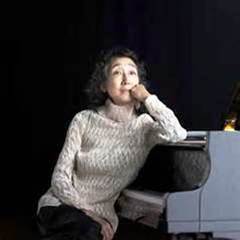|
Back
Inner Elegance, Outer Verve New York
Isaac Stern Auditorium, Carnegie Hall
02/23/2016 -
Alban Berg: Piano Sonata, Opus 1
Franz Schubert: Four Impromptus, D. 899
Wolfgang Amadeus Mozart: Rondo in A Minor, K. 511
Robert Schumann: Piano Sonata No. 1 in F-sharp Minor, Opus 11
Mitsuko Uchida (Piano) 
M. Uchida (© Courtesy of the artist)
One shouldn’t begin a review with the encore, but Mitsuko Uchida’s single encore was emblematic of her concert last night. After two hours of an intense 20th Century sonata, Mozart at his most emotional, Schubert at his most lyrical, and Schumann in his youthful whirlwind, Ms. Uchida took her bow, sat and performed.
Her selection was the Aveu from Schumann’s Carnaval, which theoretically takes 30 seconds. Ms. Uchida played the first half of the composer’s “Confession”, bowed again with that Mona Lisa smile, and left. The effect was as if we had been visiting vaults of crowns, diadems, piles of gems for two hours. And then we stepped into the lonely darkness and found a single emerald.
Yet we shouldn’t have been surprised. Whatever Ms. Uchida plays (or, as with the Cleveland Orchestra last week, conducts), is done with class, quality and an inner elegance.
Obviously, in Ms. Uchida’s inner soul , elegance means taking a single composer, embracing him the way a cosmologist embraces the universe, develops the quantum mechanics and the logic, and then rewraps them with reason and judgment.
That sounds passionless, but nothing could be further from the truth. When Ms. Uchida was studying Schoenberg, Webern and, yes, Berg, she found the passion beneath the skull. And that was certainly true with the opening Berg Sonata.
One had no doubt the packed Carnegie Hall audience had come to hear the old standbys. But so emotional, so packed with heat was the Berg early piece, that Ms. Uchida took them by surprise. I have heard countless recordings with the most unlikely artists (like Shura Cherkassky!) take on this work, but Ms. Uchida’s was unmistakable. Those core opening measures, from which everything else comes about (in quantum terms, Berg’s “Big Bang”), were almost hammered out. Not with especially loudness, but with the accents that commanded us to listen.
The repeat of that section allowed Berg to give us even more familiarity, but Ms. Uchida offered such clarity that one didn’t require that. The ultra-romantic last measures could have been Rachmaninoff (well…not exactly), but I kept thinking of Tristan as she plunged from one section to another. Her Berg was not the young Schoenberg student, but a composer aflame with sensuous–yes, sensuous–longings, which he could only fulfill through this music. And Ms. Uchida, after so many decades at the keyboard., seemed to know these emotions so so carefully.
One couldn’t help embracing the following Schubert Impromptus. While the whole program was basically Viennese, she didn’t coat these four works with any sticky coats of emotion. Yes, the first was played with an urgency, no backing off from the strange harmonic clashes. And the third, once again Ms. Uchida showed this incomparable balance of melody and drama.
After the intermission, Ms. Uchida showed a telling restraint in Mozart’s agonizing A Minor Rondo taking the middle ground between Classical literalism and something approaching what Mozart might have accomplished had he lived longer. (Then again, those futuristic chromatic notes, those all too delicate sobs might have simply been Mozart in a particular mood. We will never know.)
Admittedly, Ms. Uchida’s final piece, the longest on the program, was an eccentric choice. The pianist is hardly an eccentric, or even idiosyncratic artist. But Schumann’s First Sonata, with its homages to Clara, its nervousness, the skipping from one mood to another, is, even with the best artists, difficult, even painful to hear.
Ms. Uchida is an unparalleled artist, and when she tackled this, she obviously attempted to get to the nucleus. She played with the electrons and the whirling energy, there was much darkness, a few dances...Yet the center seemed lost in an excess of energy.
Thus, that wondrous encore. As if she were saying, “Well, don’t worry about genius unshackled. This gem is what Schumann could do. And it’s a bewitching gift for listening to the Sonata.”
Harry Rolnick
|